The 5 Best eLearning Platforms for Corporate Training

Are you looking for an eLearning platform that will help you streamline your employee training? There are many solutions worth exploring, but we’ll address the five most popular online training platforms in this post.
We will analyze their main features, consider their pros and cons, and compare their pricing to help you make a more informed choice. Before taking a detailed look at each software, let’s see what an eLearning platform is and how it works.
- iSpring Learn: Best for rapid course creation and blended learning. Comes with a powerful authoring tool and mobile-friendly access.
- TalentLMS: A budget-friendly, intuitive LMS for employee and customer training, with eCommerce and app integrations.
- Docebo: Great for social and informal learning, but best for experienced users due to a complex interface.
- Adobe Learning Manager: Strong in multilingual and partner training, with robust reporting and social learning features, but no built-in authoring.
- Litmos: Combines a simple LMS with a rich course library and video-based assessments; ideal for CRM/HR integrations.
What Is an eLearning Platform?
An eLearning platform is educational software used by schools, universities, and businesses to teach or train their learners and store learning materials.
There is no agreement on the specific features it should have. Some treat it more like a content management system (CMS), some use it primarily as a learning management system (LMS), while others regard an eLearning platform as a computer-supported collaborative learning system (CSCLS). Some organizations also use it as a virtual community of students, tutors, and professors by using knowledge management (KM) strategies.
In this article, we’ll consider an eLearning platform to be an LMS and will define it as software for managing online training. An LMS automates the most repetitive and tedious parts of training, such as collecting assignments, grading tests, processing statistics, and generating reports. Plus, it allows you to educate your employees without leaving the office, managing all processes right from your work computer. As for employees, they can take online training courses anytime, anywhere, even on their smartphones.
Top eLearning Platforms: Comparison Overview
To help you quickly compare the essentials, here’s a comparison table of the top five eLearning platforms from all the ones we reviewed. This overview highlights what each one is best suited for, along with its general type, pricing, and ratings.
| eLearning platform | Type of solution | Best for | User ratings | Pricing |
| 1. iSpring Learn LMS | A cloud-based LMS that is easy to use but features advanced user and content management, powerful authoring capabilities, and a strong reporting engine. | Small to medium-sized businesses that need to both quickly create and share eLearning courses and conduct blended training using a single platform. | G2: 4.6 | Capterra: 4.7 | Starts at $3.70 per user/month |
| 2. TalentLMS | An intuitive LMS that has all the basic options expected with an LMS and also features e-commerce and Zapier integration. | Companies looking for a cost-effective LMS for training employees, partners, or customers. It is also a good choice for those who are planning to sell online courses. | G2: 4.6 | Capterra: 4.7 | Starts at $109/user/month |
| 3. Docebo | A learning management system that offers ample opportunities for both formal and informal learning. | A great LMS for those who want to engage their employees in social learning. However, since its interface is quite complicated and requires customization, it won’t be a good fit for those who don’t have any prior experience with LMSs. | G2: 4.3 | Capterra: 4.4 | Upon request |
| 4. Adobe Learning Manager | A cloud-based learning platform that stands out with its advanced social learning capabilities, skill management, and extensive reporting. | A good solution for enterprises that need to train channel partners and provide multilingual eLearning. | G2: 4 | Capterra: 4.3 | Starts at around $4 per learner per month |
| 5. Litmos | An eLearning platform for business that combines an LMS with a robust course library. | Particularly suited for organizations looking to integrate their training with CRMs and HR systems and combine off-the-shelf courses with their custom eLearning. | G2: 4.3 | Capterra: 4.2 | Upon request |
How we tested and compared the top eLearning platforms
To give you a fair and practical overview of each learning management system, we did more than just skim through product pages. We went hands-on wherever we could and did some digging to see how each platform performs in real-world scenarios. Here’s how we approached our evaluation:
Free trials
We signed up for free trials when available to test the setup process, user experience, and how quickly someone can start creating and delivering an online training program. This gave us a clearer picture of how intuitive and user-friendly each online learning platform actually is.
User reviews
We also read through dozens of user reviews on platforms like G2, Capterra, and Trustpilot. We paid close attention to what users liked, what frustrated them, and how each platform handled support, onboarding, and everyday use.
Key features
In our comparison, we focused on key LMS features that matter most for effective training:
- Built-in course creation tools and content format compatibility (like SCORM and xAPI)
- Delivery methods, including live expert-led sessions, mobile learning, and blended learning support
- Reporting and analytics functionality
- User and role management capabilities
- Social learning features and gamification
- Integration with tools like video conferencing platforms, CRMs, and HR platforms
- An intuitive interface that allows for quick user onboarding
Pricing
Finally, we compared pricing based on publicly available data and vendor quotes. We took note of what’s included in each plan and what might cost extra, like advanced features or course libraries.
This allowed us to build a clear, side-by-side comparison so you can make a more informed decision based on your company’s training needs.
The 5 Best eLearning Platforms in 2025: A Deep Dive
Let’s take a closer look at each eLearning platform, its user experience, and how relevant it might be for your training needs.
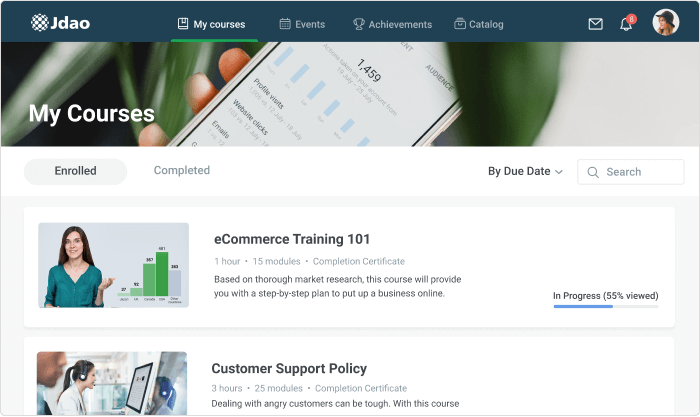
iSpring Learn is a cloud-based LMS that is easy to use but full of great functions that allow you to create and deliver training programs fast and track learner progress effectively. It is designed to cover all training needs and processes, from new hire onboarding to building complex step-by-step programs for ongoing training. iSpring Learn supports eLearning through online courses together with live lessons via web conferencing. It’s also perfect for global teams because it is available in over 20 languages to provide a native learning experience.
Key features
- Unlike many other eLearning platforms, iSpring Learn comes with great authoring capabilities. It has a built-in full-featured authoring tool for creating courses right in the LMS — iSpring Suite. The latter allows you to build engaging and interactive quality courses with audio and video, dialogue simulations, quizzes, and video tutorials.
- iSpring Learn includes a robust reporting engine with dozens of reports on training progress, completions, quiz attempts, and more. It also features a Supervisor Dashboard where key stakeholders can see the overall training success metrics and make informed decisions.
- The native mobile app for iOS and Android allows users to learn on the go, even offline, and fit learning into their busy schedules.
- The built-in Knowledge Base simplifies knowledge sharing and allows trainees to find relevant training resources and documents quickly.
- The Development Plans module lets HRs and managers create individual skill development initiatives for employees and structure onboarding for excellent support and high productivity from day one.
- 24/7 tech support is available via phone, chat, and email.
Why it stands out
iSpring Learn stands out for how quickly you can launch structured training with multiple courses, thanks to its pre-built learning tracks and intuitive role-based permissions. Unlike many LMSs that require extensive setup, iSpring lets even non-specialists roll out onboarding, compliance, or product training programs in less than a day.
→ Also read: The Onboarding Playbook, Based on Global HR Expert Insights
Best suited for
iSpring Learn is a great match for both SMBs and larger organizations that are looking for a scalable, easy-to-manage platform to centralize all training activities. You can launch any initiative, from onboarding to continuous development, without needing a dedicated LMS administrator. And with the bundled authoring tool, it’s easy to create effective training materials in-house.
For example, get inspired by SIMAC, a company that uses iSpring Learn and iSpring Suite to deliver quality maritime training to 700+ learners globally.
Limitations
While iSpring Learn provides a great learning experience with a variety of training materials, it lacks advanced built-in AI capabilities like personalized learning paths or automated content recommendations. However, the vendor has an AI assistant for instant tech support and is working on introducing more AI-powered features.
Companies that work on introducing are making a smart move. I cannot sugar-coat this one. Just like humans, those LMS vendors that do not adapt to the evolving tech will have a harder time existing.
Pricing
iSpring Learn has a flexible pricing model based on the number of active LMS users. The pricing starts from $3.70 per user/month, billed annually. A 30-day free trial is available. You can choose between two plans, Start and Business. The business plan includes an extended feature set and personalized manager support.
Get a free trial of iSpring Learn
Pros
- Development Plans for building step-by-step upskilling programs and automating the learning process
- A built-in authoring tool for creating adaptive digital learning content
- Integration with the AI-enhanced iSpring Suite course authoring tool
- An advanced reporting system with a visual dashboard
- A native mobile app that supports offline learning
- Rich integrations with third-party tools
- A simple modern interface
- Stellar 24/7 technical support
Cons
- No xAPI, PENS, or LTI support
- Limited social learning features
- Limited AI capabilities

TalentLMS is an intuitive, cost-effective LMS that has all the basic options you’d expect in eLearning platforms and features solid integrations.
The platform has basic content authoring capabilities. For example, it lets you create plain courses with various content types, including PPT presentations, videos, and SCORM packages. You can also build quizzes and surveys and include them in your course. However, many eLearning developers choose to use third-party eLearning authoring tools and then upload the content to TalentLMS.
Key features
- The system has robust eCommerce features and a built-in store. This means you can sell your content right from the platform to monetize your training materials.
- TalentLMS is also good for social learning. It features discussion boards that can help your learners and trainers stay in touch and develop professional skills together.
- It also provides great integration capabilities. The platform can connect with up to 2,000 web services and apps via Zapier, Zoom, Bamboo HR, and LinkedIn Certifications. This makes TalenLMS a solid educational technology platform.
Why it stands out
TalentLMS is noteworthy for its flexible multi-tenant architecture. It allows you to build separate training environments, each with its own branding, content, and user groups. Yet, you can still manage them all within a single account. This makes it especially valuable for companies that need to train multiple audiences while keeping content and data segmented. For example, you can launch sales training for your employees in one LMS branch and organize customer education initiatives in another.
Best suited for
TalentLMS is a good fit for companies looking for a cost-effective LMS for training employees, partners, and/or customers on a single online learning platform. It’s also a good choice for those who are planning to earn money by selling online courses.
Limitations
The reporting tools in TalentLMS are fairly basic and don’t offer advanced visualization or predictive insights. This can make it harder to evaluate training effectiveness at scale. Moreover, features like custom reports are only available with higher-tier plans.
Pricing
The pricing depends on how many active learners use the LMS each month. The initial tier begins from $109/user/month for up to 40 users. You can choose between four plans based on the features you need. It’s also possible to go for the free plan that features up to five users and 10 courses.
Pros
- Multi-tenancy with different branches can have individual URLs and a custom design
- Scheduled reports
- Robust eCommerce capabilities
- Integrations with multiple web services
- Flexible pricing plans
- No steep learning curve
Cons
- Intuitive but outdated interface
- Reports don’t provide deeper analytical feedback on your learners’ progress
- Some useful features like Custom Reports are only available in more expensive subscription plans

Docebo is a learning management system that offers a wide range of opportunities for impactful learning experiences.
The LMS allows you to upload different content types, including SCORM and xAPI courses and has a simple built-in content editor to create HTML pages from text and media.
Key features
- Docebo prides itself on its AI features. For instance, all the content uploaded to the LMS digital space is analyzed by the system’s AI and tagged with keywords. This helps learners find the materials they need much more quickly.
- With Docebo’s Marketplace, users can buy ready-made courses on various topics created by professional course developers.
- The Coach & Share module for informal learning is another standout capability. Docebo enables learners to record demos, lectures, webinars, and calls directly in the system and share them with peers. They can ask questions to experts and receive answers. However, all these options are available for an additional fee.
- Docebo also provides multi-language support with 40+ languages for localization.
Why it stands out
Docebo sets itself apart due to its strong focus on informal and social learning. The LMS makes it easy to turn employees into content contributors. Thanks to this, teams can share internal expertise more easily through user-generated videos, tutorials, and discussions. This makes Docebo a good platform for collaborative, bottom-up professional development.
Best suited for
Docebo is best suited for businesses and enterprise organizations that want to promote collaborative learning and foster organic knowledge retention. It works well for teams looking to mix formal training with more social, on-the-job learning.
Limitations
Unfortunately, Docebo’s flexibility comes at the cost of simplicity. The LMS doesn’t have a user-friendly interface and often needs a dedicated admin to configure the platform. For teams without technical experience, even routine tasks like setting up learning paths can feel overly complex. Besides, some core features are sold as add-ons, which can incur unexpected costs.
Pricing
The vendor doesn’t list the price on their website, so you’ll need to reach out to Docebo’s sales manager for a quote. No free trial is available, but you can request a live demo.
Pros
- Advanced content management with AI
- Great support for social learning with an ability to create and share learner-generated content
- An ability to localize the user portal to 40+ different languages
- A rich library of ready-to-go courses
- A large number of branding options
Cons
- A cumbersome and unintuitive interface that’s complex for novice LMS users
- Requires a good deal of customization for a good learning experience
- Many modules and features are only accessible in higher-priced purchase plans
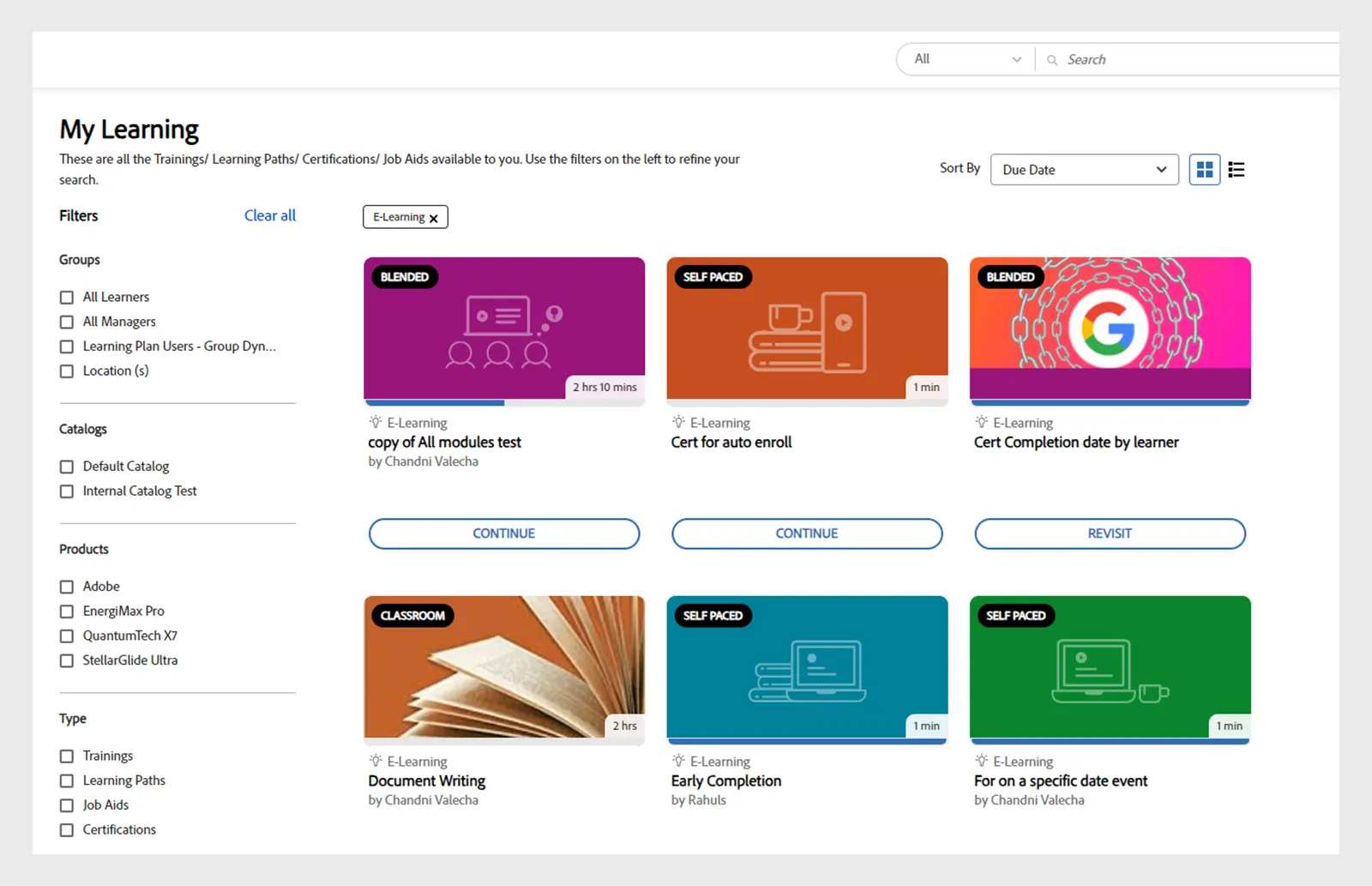
Adobe Learning Manager is a cloud-based learning platform that stands out with its advanced social learning capabilities, skill management, and extensive training data reporting.
Key features
- The LMS allows admins to create and manage external groups, like training business partners.
- Adobe Learning Manager has a library of off-the-shelf courses users can purchase separately.
- If you work in a multilingual environment, the platform will be of great help. Unlike LMSs without localization features, it enables you to make multiple versions of courses in different languages.
- Like Docebo, Adobe Learning Manager has rich social learning capabilities. It allows learners to record videos and audio and share them with their colleagues. It also provides course-specific discussion boards where users can post their questions or messages.
Why it stands out
Adobe Learning Manager has a granular skill management system that goes beyond basic progress tracking. It allows admins to create structured skill hierarchies and align complex training paths with business and learning objectives. This is especially valuable in industries with frequent re-certification or strict compliance requirements.
Best suited for
Adobe Learning Manager is a good fit for companies with strong compliance, certification, or partner enablement needs.
Limitations
Adobe Learning Manager lacks a built-in authoring tool — you’ll need to invest in separate software like Adobe Captivate or another third-party tool to create eLearning content. The customization options for branding and learning paths are limited compared to other enterprise-grade LMSs.
Pricing
Adobe Learning Manager follows a per-active-user pricing model. It starts at around $4 per learner per month. However, final pricing depends on usage type (internal vs. external learners), feature requirements, and contract length. To get an exact price, you’ll need to contact Adobe. Keep in mind that you’ll need to purchase a subscription to an authoring tool separately if you need one.
Pros
- A robust reporting engine with graphics and scheduled reports
- Extensive social learning features
- A course catalog that offers a great number of courses on various topics to build new skills
- Allows management of both internal learners and external users
- An ability to create multiple versions of the content in different languages
Cons
- No built-in authoring tools
- Courses in the content library can be expensive
- Limited branding functionality
- Weaker security features compared to other LMSs

Litmos is a user-friendly eLearning platform for business that combines an LMS with a robust course library. It covers all the basics perfectly: you can launch individual courses and training programs, track progress, and scale employee training in a structured manner.
Key features
- Litmos has a decent set of content authoring features. You can create quizzes and surveys, assemble simple text pages with information, embed content from any site, and add ready-made courses.
- The platform also enables video assessments with AI-powered analysis for pace, keywords, and tone, which is ideal for soft skill training and sales coaching.
- Multi-branding support can be built within a single account. This allows different business branches or partners to have their own learning portals.
- Litmos offers a solid set of automation features for enrollments, reminders, and certifications through the optional Automation Bundle.
- Then there’s Litmos Heroes, a catalog that offers video-based courses on different topics, including personal development, customer service, and IT skills. However, the library is accessible only with the more expensive pricing plan.
Why it stands out
The LMS focuses on operational efficiency. This is a huge plus for companies where training needs to scale across roles, regions, or partners with minimal administrative effort. Thanks to the multi-brand portal feature, you can deliver targeted training experiences and course content to different audiences.
Best suited for
Litmos is a good choice if you want to combine off-the-shelf courses with custom training and integrate learning tightly into your existing CRMs, HRIS, and other systems. Companies with distributed teams or partner networks will also find the LMS useful.
Limitations
The content authoring capability in the LMS is functional but pretty basic. Also, customization depth is limited, especially in learner role permissions and advanced reporting layouts. Finally, some useful LMS features, like full access to the content library, are only available with the higher-tier plans, which can drive up the total cost.
Pricing
No prices are listed on the vendor’s website. So, if you have any questions about pricing, you’ll need to request a quote from the vendor.
Pros
- Simple, UX-driven design
- A built-in capability to create video assessments
- Off-the-shelf content with a Litmos Heroes course library subscription
- An easy-to-use mobile app that provides access to the same options as the browser version
- An ability to create multiple brands inside the portal that feature unique learner portal design
- An eCommerce capability that allows you to build your own course catalog
Cons
- Very limited customization capabilities for user roles
- The course library is separate from the LMS and is not available with a basic pricing plan
- Some additional options like Automation Bundle need to be purchased separately
Honorable Mentions: eLearning Platforms That Almost Made the List
Here are some other solid platforms that didn’t quite catch up to our top five but are still worth looking into.
LearnUpon
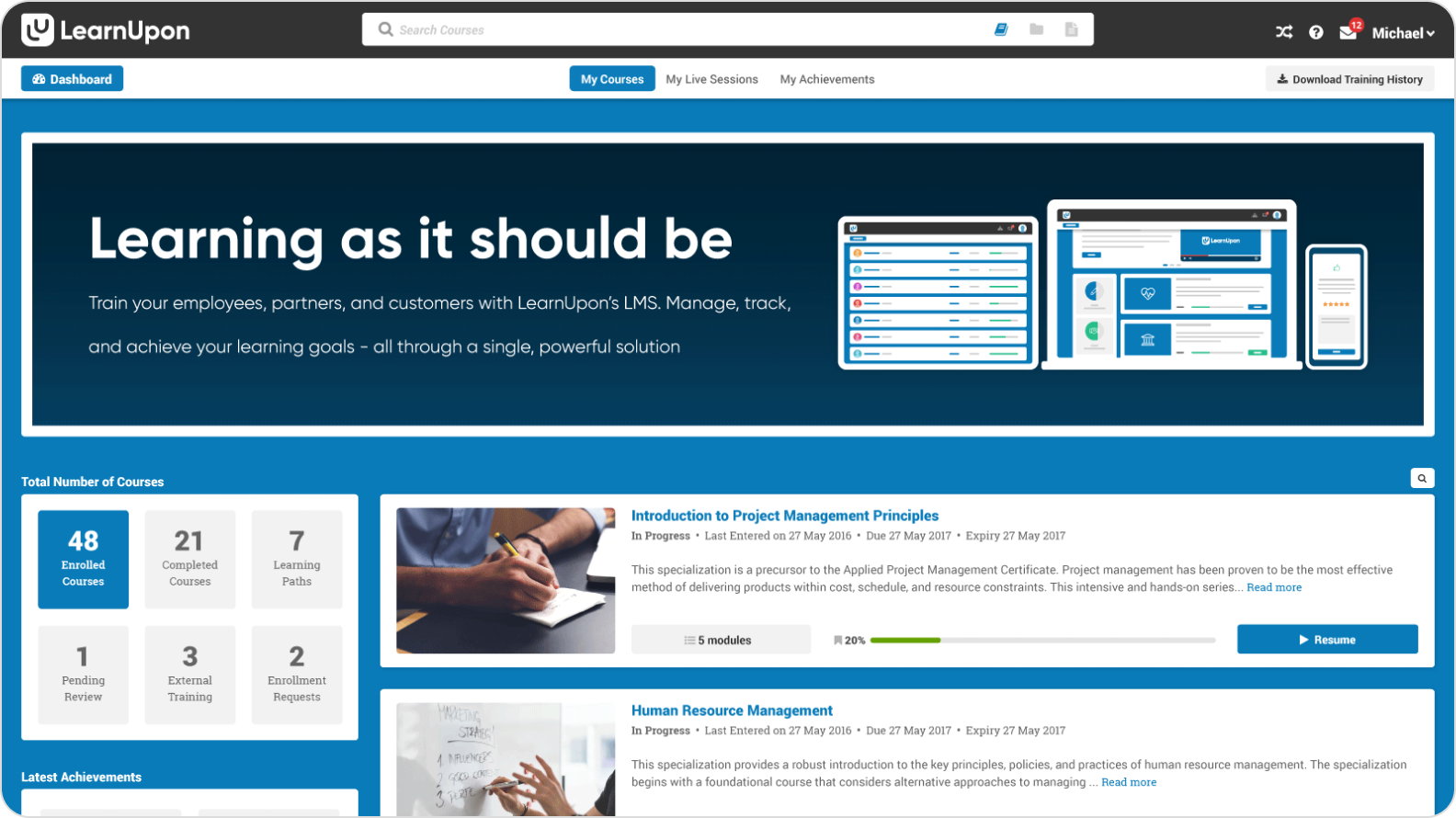
If you’re juggling internal training with customer or partner education, LearnUpon makes it easy to manage it all in one place. Its real strength is in how easily you can run separate learning portals under one account. Unified reporting saves time and helps you avoid data silos. It also features the Learning Journeys capability for personalized employee skill building.
Moodle Workplace
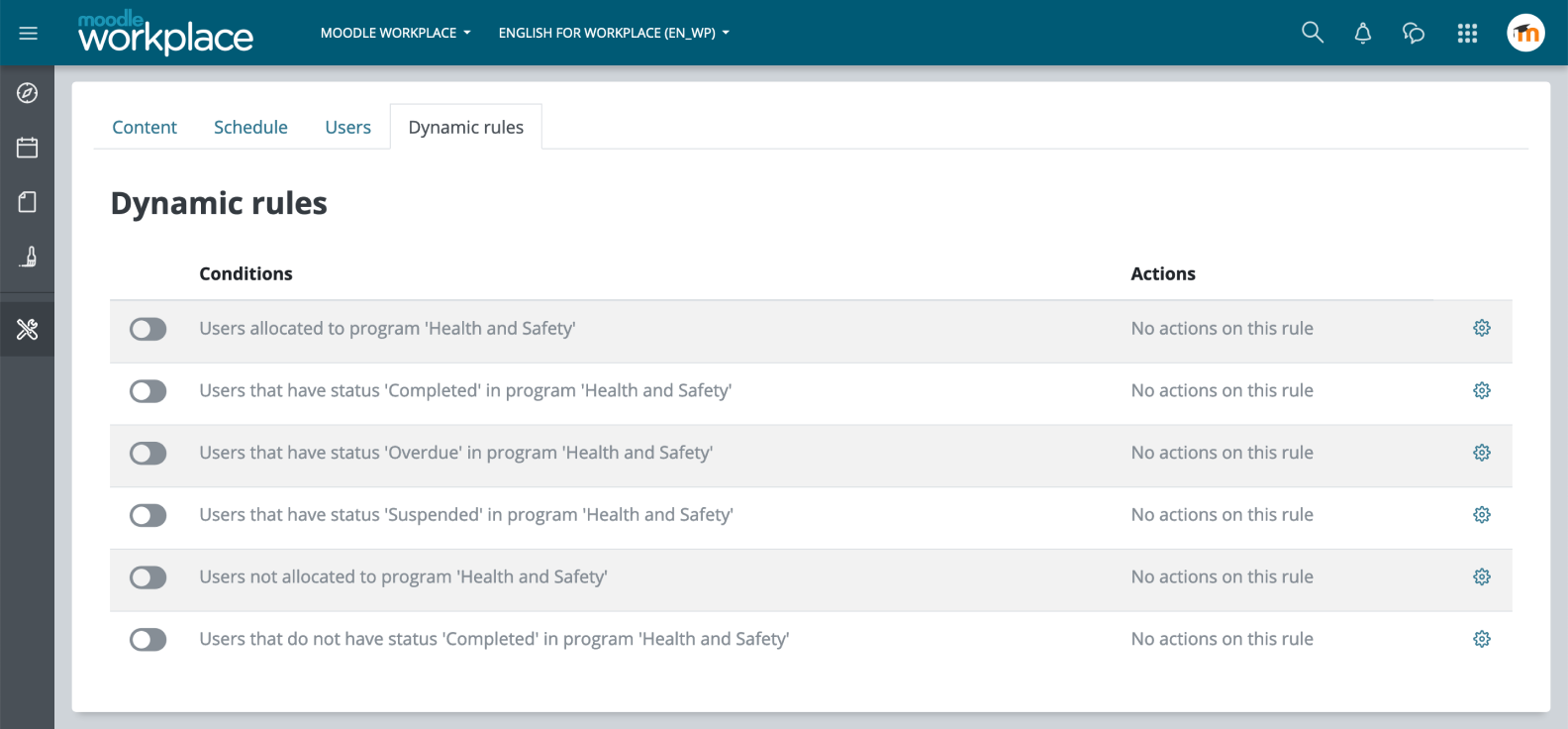
Moodle is a big name in the eLearning industry. Its Moodle Workplace LMS is best for companies that need flexibility above all else. It’s open-source at the core, which means you can customize almost anything, from workflows to reports to integrations. But that’s only possible if you have the in-house tech support to handle the process. In other words, it’s great for organizations that don’t want an out-of-the-box solution.
Tovuti LMS
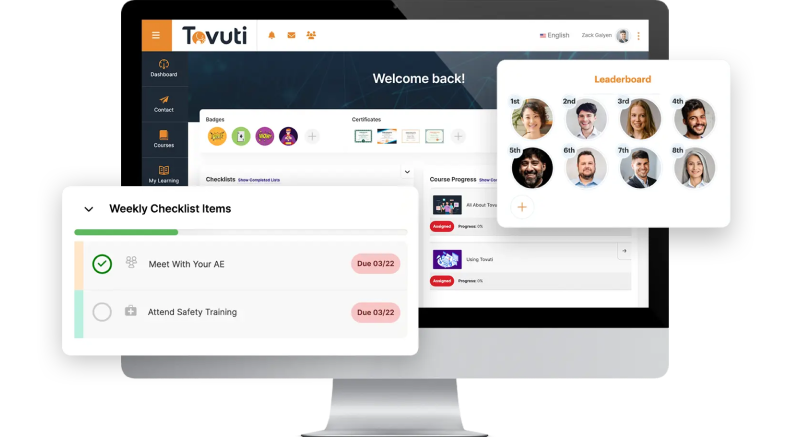
Tovuti is a good fit for companies that want more than just training delivery. It includes a built-in tool for interactive content creation, like memory games, timelines, and hotspots. It’s a smart option if you want to improve learner engagement without investing in separate authoring software.
How to Choose an eLearning Platform
With over 800 learning management systems competing in the learning marketplace, it is extremely challenging to choose one solution, especially if it’s your first eLearning platform. The first thing you need to do when selecting a platform is to address your needs. Here are three important points to consider when deciding:
Academic vs. corporate
Both categories of eLearning platforms allow you to automate some training and education processes and provide access to learning materials online. University and corporate LMSs have some significant differences and a different focus — they have distinct organizational structures, scheduling units, and tracking and assessment systems. Besides, corporate LMSs are more flexible and allow for easier and more frequent content updates.
Industry and use cases
There may be some special requirements for an LMS, depending on your industry. For example, if you’re a healthcare organization, you might need an LMS that can be integrated with a hospital management system and ACCME web services.
When choosing an eLearning platform, you also need to know if it can cover all of your use cases. For instance, can it help you automate employee onboarding or does it work for channel partner training? For example, when training business partners, you might want to create groups of external learners who will have access to specific learning materials but will be limited in terms of viewing other content and using other LMS capabilities.
Features
It can be useful to make a list of LMS requirements to find out which vendor provides the features you need. It’s also a good idea to read customer reviews on any given LMS. To help you narrow the field, we’ve prepared a list of common learning management system requirements so you can check them out.
Do you want to make the decision-process easier? Look for platforms with free trials, robust support, and lots of versatility. L&D budgets are usually slim for tech so you’ll want to maximize value.
FAQ on eLearning Platforms
If you’re still wondering why online learning platforms are worthy of your attention, check out the following answers.
Why do I need an eLearning platform?
Whether it’s an LMS, CMS, or even a CSCLS, an eLearning platform provides autonomy and extended control over training in your organization. These software solutions streamline in-house training processes and enable you to build a knowledge management system that’s adjusted to your needs.
What are the advantages of online learning?
The opportunities that online learning provides in both training and education are almost unlimited. Here are some of the advantages of eLearning for businesses:
- Flexibility. Learners can take courses online, anytime, anywhere, and on any device.
- Cost-effectiveness. Companies save time and money on training facilitation, travel, accommodations, etc.
- Progress monitoring. Automated tracking and reporting of learner results avoid overlooking training bottlenecks.
- Scalability. Companies can streamline training across multiple teams, departments, and branches no matter where they’re located.
- Self-paced learning. In contrast to traditional classroom training, learners don’t get distracted from their work tasks or feel obligated to participate in seminars. eLearning fits into the busiest schedule wonderfully.
Wrap Up
This article took an in-depth look at five eLearning platforms that are a perfect fit for corporate training. All of these solutions may seem very similar at first sight, but each one has its unique capabilities. Try out a couple of platforms via a free trial or a live demo to see which one meets your specific business needs.
Are you in search of a straightforward and user-friendly platform that will let you launch training in a single day and provide great functionality for eLearning content authoring? Get a free trial of the iSpring Learn LMS. No credit card or corporate email is required. Start today!




